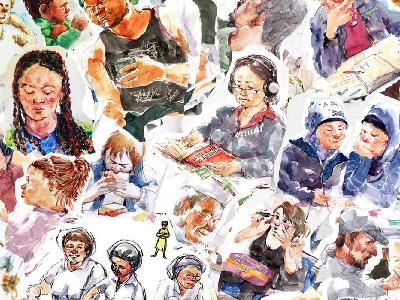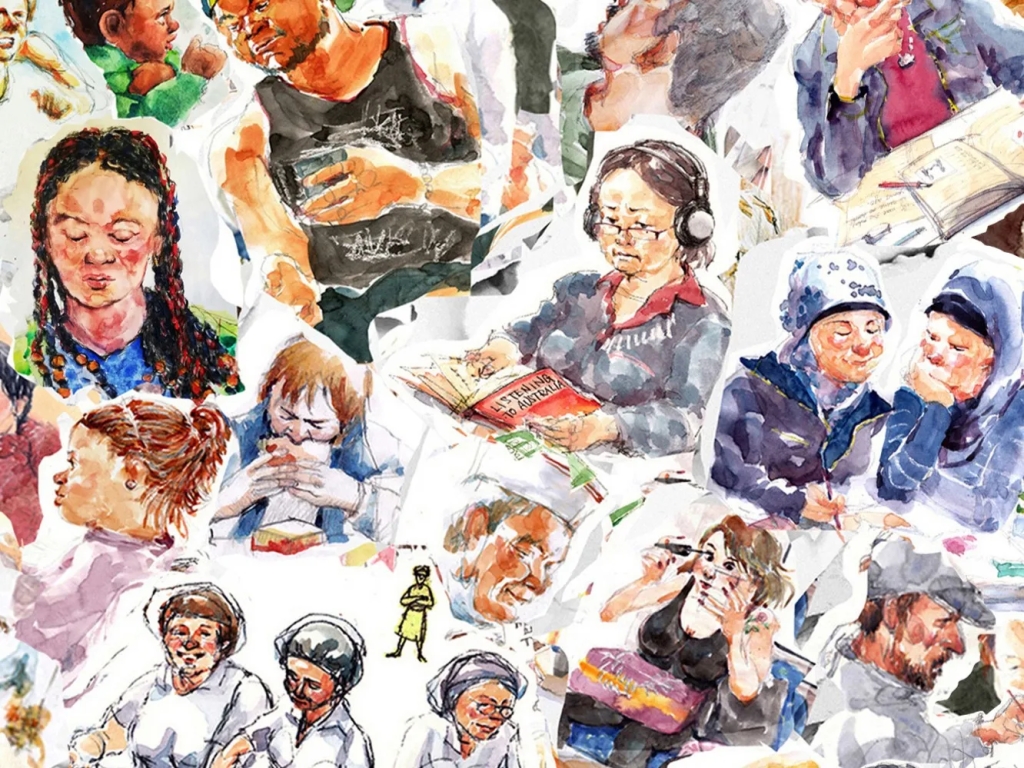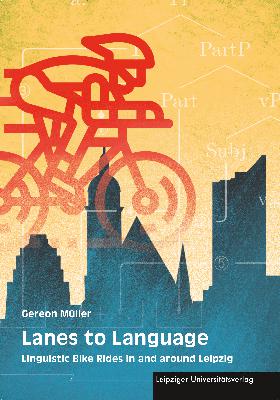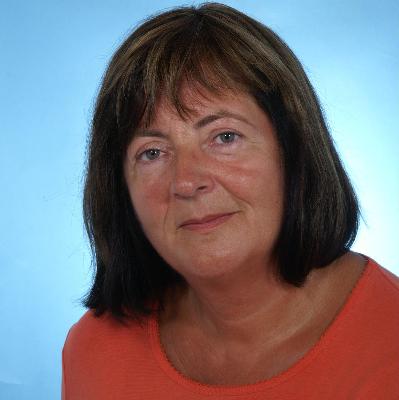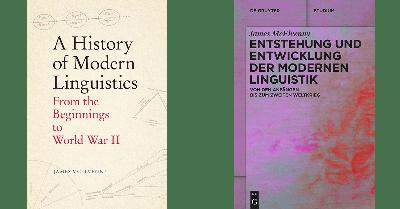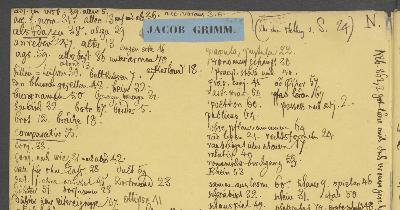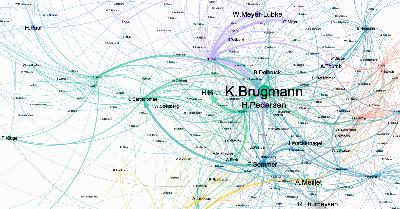Podcast episode 39: Interview with Ingrid Piller on Life in a New Language
Description
In this interview, we talk to Ingrid Piller about her forthcoming co-authored book Life in a New Language.
<figure class="wp-block-audio"></figure>
Download | Spotify | Apple Podcasts | Google Podcasts
References for Episode 39
Kachru, Braj B. 1985. ‘Standards, codification and sociolinguistic realism: The English language in the outer circle’, in English in the world: Teaching and learning the language and literatures, ed. Randolph Quirk and Henry George Widdowson, pp. 11–30. Cambridge: Cambridge University Press.
Piller, Ingrid. 2023. ‘Scholarly sisterhood: Collaboration is our academic superpower’. Language on the Move. https://www.languageonthemove.com/scholarly-sisterhood-collaboration-is-our-academic-superpower/
Transcript by Luca Dinu
JMc: Hi, I’m James McElvenny, and you’re listening to the History and Philosophy of the Language [00:13 ] Sciences Podcast, online at hiphilangsci.net. [00:18 ] There you can find links and references to all the literature we discuss. [00:22 ] Today we’re joined by Ingrid Piller, who’s Professor of Applied Linguistics at Macquarie University in Australia. [00:29 ] Ingrid has many different areas of expertise within the vast field of applied linguistics, [00:35 ] including in intercultural communication, language learning, multilingualism, and bilingual education. [00:42 ] Ingrid’s also the co-founder and one of the leading contributors to the multi-author scholarly [00:48 ] blog Language on the Move, which has recently branched out into a podcast, [00:54 ] and she’s going to talk to us today about her latest book project, a collective volume [00:59 ] that she’s co-edited with several colleagues from Language on the Move, about the experience [01:05 ] of learning a new language and making a new life in that language after migrating to another [01:10 ] country. [01:11 ] This book will appear soon with Oxford University Press under the title Life in a New Language. [01:18 ]
So Ingrid, to get us started, could you tell us a bit about your forthcoming book? What [01:22 ] is it about, and what approach does it take? [01:25 ]
IP: OK, well, thanks, James, for having me on the show. [01:29 ] So Life in a New Language, first thing I should say, it’s not a co-edited book, but a co-authored book. [01:35 ]
JMc: OK. [01:36 ]
IP: And I think that’s really special about it. [01:40 ] So it answers the question: what does it mean to start a new life through a new language [01:48 ] and what kind of settlement challenges do new migrants face? [01:53 ] And this is a question that myself and my students and my Language on the Move colleagues, [01:59 ] as you’ve said, has been a key research question for us over more than 20 years. [02:07 ] And in the late 2010s, a couple of us were getting together and were saying, ‘Well, look, [02:15 ] we’ve got a number of really interesting but separate studies, and we’ve collected all [02:21 ] these data, we’ve interviewed and sat with and spent time with and conducted participant [02:27 ] observation with so many migrants from so many different contexts over so many years. [02:35 ] Why don’t we actually get together and reanalyse those data?’ [02:39 ]
And so methodologically, it’s a real innovation in that we are actually reusing data from [02:46 ] existing sociolinguistic ethnographies, and so it’s a data-sharing project, and there [02:54 ] are six projects from which we bring together data. [03:01 ] So there is one that I started in the early 2000s at the University of Sydney, and that [03:11 ] was an ethnography with highly achieving second language learners. [03:16 ] So at the time, I was particularly interested in people who had learned English to such [03:22 ] high levels that they could pass for a native speaker, and so that was the first cohort of people who went into it. [03:31 ] Then another PhD, data from a PhD that focused on the experiences of European migrants to [03:38 ] Australia, that was done by Emily Farrell and completed in 2010. [03:46 ] Then three other PhDs completed here at Macquarie University, one by Vera Williams Tetteh about [03:54 ] the language learning and settlement experiences of African migrants to Australia, [03:59 ] one by Shiva Motaghi Tabari about the experiences of Iranian migrants, and she was particularly focusing [04:11 ] on parenting and heritage language maintenance in that context. [04:16 ] And then data from another sociolinguistic ethnography with female migrants and how… The focus [04:23 ] of the PhD was on how gender influences the migration experience. [04:29 ] And then the sixth project that went into it was a project that was funded by a New Staff Grant here at Macquarie University to Loy Lising [04:38 ] about the experiences of skilled migrants from the Philippines [04:44 ] who arrived here under a temporary skilled work visa and went [04:49 ] straight into workplaces and what their experiences were. [04:53 ]
And so we brought all these data together that we’d collected for separate projects. [04:58 ] I mean, I have to say, I was involved in all of these projects. [05:01 ] I either was the PhD supervisor or the researcher or the sponsor or mentor of the research. [05:08 ] So I was involved in all of these. Even so, they were actually… I mean, in hindsight, [05:13 ] they were very disparate and some of the challenges in terms of data sharing, you only notice [05:19 ] them like in hindsight. ‘Oh, if we’d done this more consistently or that more consistently, would have been easier.’ [05:26 ] But anyway, so we set ourselves the challenge of actually bringing all this data together [05:32 ] and reanalysing them with a new set of research questions focused on language learning experiences, [05:41 ] interactional practices, like how do you make friends, how do you actually find someone [05:45 ] to talk to? Which is a not trivial problem. Experiences of finding work; that was relevant [05:53 ] to everyone. Regardless of how we had originally set up the research, everyone wanted to talk [05:59 ] about… I mean, we have so many data about finding work and not finding work at the [06:03 ] level you want to find work, then experiences with making family in a new context because inevitably your family changes, right? [06:13 ] Some people are left behind, but even like the people with who you migrate, you know, [06:19 ] your relationship changes, new challenges arise like parenting, bilingual parenting, [06:24 ] do you pass on the heritage language, do you focus on English, experiences with racism [06:31 ] and experiences with belonging — how do you create belonging and a sense of connection? [06:37 ] And so these were the research questions we asked of these data and so overall now [06:44 ] we then have an analysis based on data with 130 migrants from 34 different countries [06:54 ] on all continents, pretty much over a period of 20 years, the earliest of these arrived [07:02 ] in Australia in 1970 and the last to arrive was someone who arrived in 2013. [07:12 ]
JMc: But in every case the country that they moved to is Australia, is that correct? [07:17 ]
IP: Yes, that’s correct, yeah. [07:18 ]
JMc: And do you think language is a key feature of the migrant experience that you’ve analysed? [07:25 ]
IP: Yeah, so, I mean, we’re only looking at migrants from non-English speaking backgrounds, so all of them had to learn English. [07:33 ] So that was a key feature of their experience because, you

